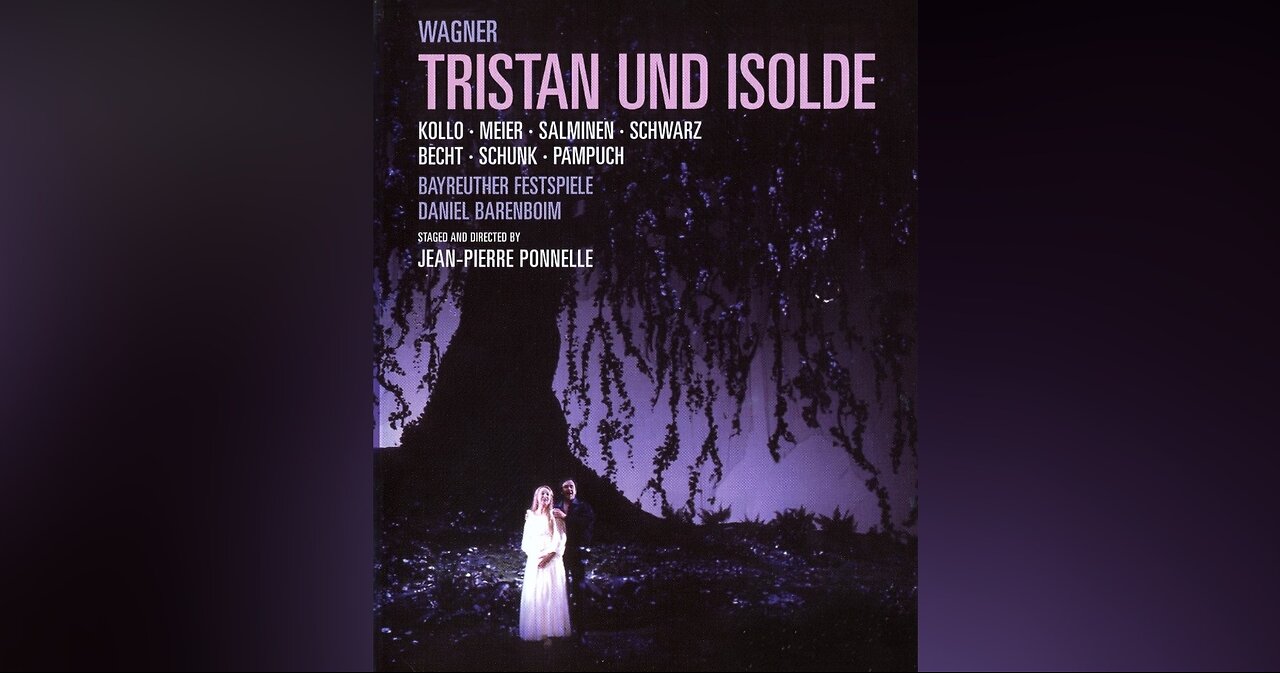Premium Only Content

Tristan und Isolde - Act I (Bayreuth Festspielhaus 1983)
Composer: Richard Wagner
Librettist: Richard Wagner
Premiere: 10 June 1865, Munich (Royal Court and National Theatre)
Language: German (English subtitles)
Synopsis: https://www.opera-arias.com/wagner/tristan-und-isolde/synopsis/
Act II-III: https://rumble.com/v2ezd5k-tristan-und-isolde-act-iii-bayreuth-festspielhaus-1983.html
Tristan und Isolde (Tristan and Isolde, or Tristan and Isolda, or Tristran and Ysolt) is an opera, or music drama, in three acts by Richard Wagner to a German libretto by the composer, based largely on the romance by Gottfried von Straßburg. It was composed between 1857 and 1859 and premiered in Munich on 10 June 1865 with Hans von Bülow conducting. Wagner referred to "Tristan und Isolde" not as an opera, but called it "Eine Handlung" (literally drama or plot), which was the term used by the Spanish playwright Calderón for his dramas. Wagner's composition of Tristan und Isolde was inspired by his affair with Mathilde Wesendonck and the philosophy of Arthur Schopenhauer. Widely acknowledged as one of the peaks of the operatic repertory, Tristan was notable for Wagner's advanced use of chromaticism, tonality, orchestral colour and harmonic suspension.
The opera was profoundly influential among Western classical composers and provided inspiration to composers such as Gustav Mahler, Richard Strauss, Karol Szymanowski, Alban Berg and Arnold Schoenberg. Many see Tristan as the beginning of the move away from conventional harmony and tonality and consider that it lays the groundwork for the direction of classical music in the 20th century.
SYNOPSYS
- Previous History: To free Cornwall from paying tribute to Ireland, Tristan, nephew of King Mark of Cornwall, had killed Morold, the champion of Ireland, in single combat. Severely wounded in the battle, Tristan had made his way to Ireland where, under the assumed name of Tantris, he had been healed by the magical arts of Isolde, daughter of the king.
Isolde, who had been betrothed to Morold, recognised Tristan (a piece broken out of his sword matched the fragment in Morold's head), but spared his life. On his return to Cornwall, to satisfy jealous courtiers that he was not aspiring to the throne, Tristan had persuaded his uncle to ask for the hand of Isolde. - Act I - On board Tristan's ship returning from Ireland to Cornwall:
Raging at her fate, Isolde laments that she has not her mother's magic art of calling up a storm to wreck the ship. She is angry that Tristan keeps apart and sends her attendant Brangäne to summon him. Tristan answers mildly that he must steer the ship; but his retainer Kurwenal answers roughly that Tristan is not Isolde's vassal, singing a vigorous song, taken up by the sailors and clearly audible to Isolde, celebrating Tristan's killing of Morold. Isolde tells Brangäne how she had spared Tristan's life when he was in her power and complains bitterly that he has repaid her by seeking her as a bride for his old uncle, an insult that no one would have dared if Morold were alive and Cornwall still owed tribute to Ireland. Brangäne reminds her of the love potion which her mother has given her, but Isolde thinks only of the poison which is in the same chest. When Kurwenal announces their imminent arrival in Cornwall and tells her to prepare to land, she gives him a message for Tristan: he must make amends for an unatoned wrong. She orders Brangäne to pour the poison into a golden goblet. When Tristan arrives, she reproaches him with having avoided her during the voyage. He replies that he intended no discourtesy, but rather greater respect by keeping his distance from his uncle's bride. Isolde claims that Morold's blood still lies between them, as she was not party to any reconciliation. He offers his sword for her to kill him if Morold was so dear to her, but she says King Mark would hold it against her if she killed him. Instead she offers a drink of atonement. Understanding her intention, he drinks and Isolde seizes the goblet and drinks the remainder. But Brangäne has substituted the love potion and they fall into each other's arms, oblivious of all around them, as the ship reaches land and King Mark approaches to claim his bride.
Conductor: Daniiel Barenboim
Chor & Orchestra: Bayreuther Festspiele
Staged & Directed by: Jean-Pierre Ponnelle
Set & Costume design by: Jean-Pierre Ponnelle
Cast & Characters:
René Kollo: Tristan
Matti Salminen: König Marke (King Marke)
Johanna Meier: Isolde
Hermann Becht: Kurwenal
Robert Schunk: Melot
Hanna Schwarz: Brangane
Helmut Pampuch: Ein Hirt (a shepherd)
Martin Egel: Ein Steuermann (a helmsman)
Robert Schunk: Ein Junger Sieemann ( a young sailor)
-
 45:45
45:45
Adaneth - Arts & Literature
24 days agoBeethoven: Symphony No.3 'Eroica' | John Eliot Gardiner & Orchestre Revolutionnaire et Romantique
46 -

Michael Heaver
12 hours agoBritain's Enraged Voters Reject EXTREME Agenda
76 -
 LIVE
LIVE
Rebel News
1 hour agoNo trade deal for Carney, Christian cancelled in BC Bible Belt, Liberal bail reform | Rebel Roundup
352 watching -
 LIVE
LIVE
The Drew Allen Show on DailyClout
45 minutes ago"Russiagate Is ‘Crime of the Century’"
82 watching -
 1:20:41
1:20:41
Steven Crowder
4 hours agoBill Burr Flames Out on Conservatives, Whites, and... Ben Shapiro
132K93 -
 56:58
56:58
The Rubin Report
3 hours agoHow to Protect Yourself from Toxic Beliefs | Eckhart Tolle
27.7K24 -
 LIVE
LIVE
The Mel K Show
2 hours agoMORNINGS WITH MEL K -Collateral Consequences of The Russia Hoax Must Be Addressed! 8-1-25
1,111 watching -
 LIVE
LIVE
Film Threat
17 hours agoTHE NAKED GUN BLOWS COMEDY | Film Threat Livecast
141 watching -
 LIVE
LIVE
Flyover Conservatives
12 hours agoAVOID BURNOUT: Why You Must View Your Work As Worship - Clay Clark | FOC Show
219 watching -
 36:09
36:09
Rethinking the Dollar
2 hours agoU.S. Job Market Fails—Real Talk on Gold, Ray Dalio & World ID | Morning Check-In
2.27K5